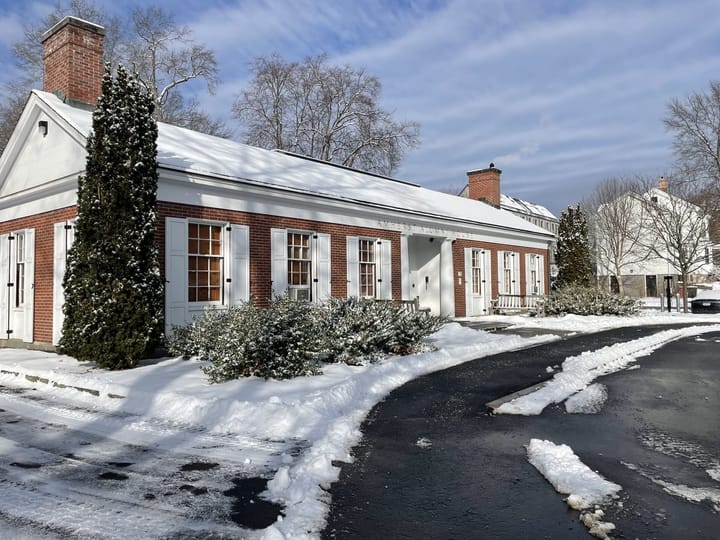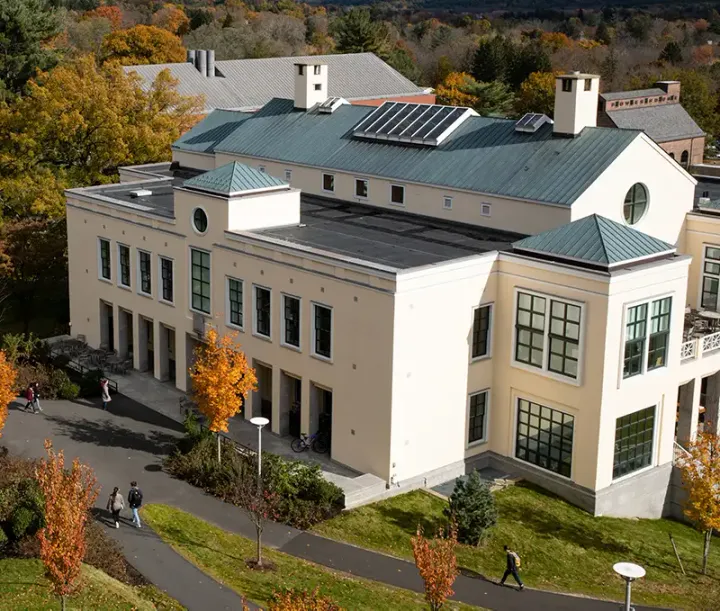Thoughts on Theses: Sylvan Wold
In this edition of Thoughts on Theses, Staff Writer Ava Nair ’28 interviews English major Sylvan Wold ’25 about her creative nonfiction thesis structured around artifacts of her mother’s life.

Q: I’m super excited to talk about your thesis; would you mind starting by introducing yourself before we get started?
A: Sure! I’m Sylvan. I’m an English major, and I’m one of the captains of the cross country team. I also studied abroad last semester in Copenhagen, [Denmark] which was amazing. I think everyone should go abroad if they can. The program I did was really big and pretty [accessible] — you don’t need to know Danish or fully immerse yourself, and you can travel almost every weekend. That kind of flexibility was perfect for me because I really wanted to explore Europe.
Q: How fun! So, getting into your thesis, what is it about, and why did you decide to pursue one?
A: I’m writing a creative thesis in English. Originally, I was interested in doing a creative-critical thesis, which combines analytical writing with a creative component. But when I went to the info session, the advice was basically: “Don’t do [a creative-critical thesis] unless you really have a strong reason to, because it’s much harder [to combine the two forms].” So I thought — why not fully commit to the creative side? I’ve only taken one formal creative writing class, which was “Creative Nonfiction” taught by [Visiting Assistant] Professor [of English] Victor Yang, who doesn’t teach here anymore but was incredible. The class had this really special group dynamic, and I think that experience just made me want to keep writing creatively. I’m not planning to pursue creative writing after college, so I saw the thesis as my last big chance to work on something meaningful in that space. Ultimately, I decided to write about my mom, who passed away when I was younger. I’m not even sure why I felt drawn to write about her — it’s just something I’ve always gravitated toward in my creative work. There’s a lot to unpack, and it feels important to me.
Q: That’s really sweet. Did you always know you wanted to write about this?
A: I wrote about my mom for a final project in that creative writing class sophomore year, and I think this thesis has kind of grown out of that. But I wouldn’t say I was always planning to write a thesis. It was more of an impulse — I thought, “Why not?” and just went for it. I know some people write theses to get into grad school or to publish, but that was never my motivation. I’m doing it because I love to write.
Q: What is the structure of your thesis?
A: The structure is centered around artifacts from my mom’s life — three objects she left behind: her personal notebook from college, her high school yearbook, and a [college] senior-year project. Each chapter revolves around one of these items, and I use them to think about how I’ve come to know her through the physical traces she left behind. For example, in her college notebook, there are entries about boys and silly things that are so relatable. It’s strange and kind of funny to think about your parent going through the same things you’re experiencing now. [The process has] opened up a lot of reflection on my own life and the parallels between us.
Q: That is really interesting. What was the hardest part of getting started? Did you deal with writer’s block?
A: Oh, absolutely. The entire first half of the fall semester, I didn’t really write anything. I was just brainstorming — trying out ideas, discarding them, and starting over. The hardest part wasn’t the writing itself; it was figuring out what I even wanted to write about and how to structure it. Once I landed on the idea of using artifacts, everything clicked into place. I’m definitely someone who needs to have a clear structure and outline before I can really get going, and getting to that point took way longer than I expected.
Q: What’s it been like writing something so personal? Is it mostly for you, or do you think about the readers?
A: It’s definitely for me. This is a very personal project — it’s really about my own relationship with my mom, and I’m using the writing process to grapple with that. But at the same time, it’s weird knowing it will be available to the Amherst community. The idea of someone I don’t know reading something so intimate is strange. But that’s just part of writing creative nonfiction — it’s vulnerable by nature.
Q: Have you shown it to anyone besides your advisor?
A: A little bit. I’ve shared drafts with one friend and my boyfriend. It’s so personal that I’ve been cautious about who I show it to. I plan to share it with more people — my dad, other close friends — once I feel more confident about it. I think you have to be careful with creative writing when it’s still in progress. [Winthrop H. Smith 1916 Professor of American Studies and English] Lisa Brooks once said that you need two types of critics: one who’s kind and encouraging for the early drafts, and one who’s tough and honest for the final version. I think that advice really stuck with me.
Q: Speaking of your advisor, have they played a big role in your process? Is there anyone else who has been especially helpful?
A: My advisor, [English Writer-in-Residence] George Abraham, has been amazing. They’re a newer professor, and from our very first meeting over Zoom last summer, I could tell they were really excited about working with me. That kind of enthusiasm makes a huge difference — just having someone who believes in the project and is rooting for you. That’s been the most valuable support.
Q: What obstacles have you faced — especially balancing thesis work with cross country, senior year, and daily life?
A: First semester was rough. I was job hunting on top of everything else, and honestly, that felt like an extra class in itself. Balancing that with my thesis, my other classes, and running was a lot. What helped was finding ways to let my coursework feed into my thesis. I’ve taken classes where I could write pieces that later became part of my thesis, which was so helpful. It made things feel less siloed and more integrated.
Q: What’s it like seeing how your experience compares to friends doing other types of theses?
A: It’s definitely different. Most of my friends are doing critical theses. Creative theses are their own beast — there’s so much subjectivity, and it’s hard to know how people will receive it. That can be scary, but I’ve also found a lot of freedom in it. There are fewer constraints, and I’ve been able to shape the project exactly how I want.
Q: Is there any advice you would give to someone thinking about writing a thesis?
A: Use your classes to support your thesis. There are so many classes at Amherst — especially in the humanities — that involve creative or reflective writing, even if they’re not labeled as creative writing courses. If you can find ways to write about your thesis in those classes, it makes the whole process so much more manageable. That’s been the most helpful strategy for me.





Comments ()